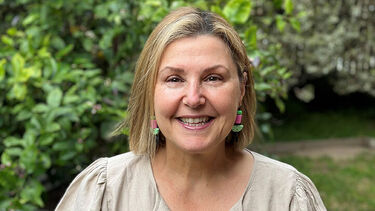
When Yola Armstrong took on a job in a mostly male workplace, she considered two options: hide her menopausal symptoms or embrace them, quirks and all. Here, the 56-year-old recalls the unexpected joys that came from learning to be “unapologetically menopausal”.
Entering my 40s, I thought I had experienced it all. After battling polycystic ovaries, endometriosis and breast cysts, I underwent a hysterectomy [an operation to remove the uterus]. Little did I know at the time that these were only precursors to the main event: menopause.
My first encounter with menopausal symptoms at work occurred in the supportive environment of Berry Street, a child and family welfare organisation in Melbourne. Surrounded by a staff of strong, compassionate women, I found it easier to navigate the hot flushes, brain fog, mood swings and sleep deprivation. I was one of the lucky ones. This safe space empowered me to speak openly about what I was experiencing. It was here that I learnt the value of voicing my needs and acknowledging my experience which proved invaluable when I later moved into a more male-dominated corporate environment.
In this supportive and inclusive environment, I could be myself – hot flushes, brain fog and all. This wasn’t just accepted; it was normalised. I didn’t have to hide or pretend that I wasn’t struggling. The freedom to express myself without judgment was invaluable and gave me the confidence to address menopause head-on. I learnt to embrace the ‘power surge’ of hot flushes and the occasional brain fog that left me searching for the right word or phrase.
Transitioning to work in a corporate setting was a different experience. My initial instinct was to hide any evidence of menopause as I was apprehensive about how my symptoms would be received in a mostly male environment. When the hot flushes hit, I remember feeling the eyes on me as I tried to will the flushes away.
However, as time went on, I realised that hiding my symptoms only added to my discomfort and stress. Fortunately, I found support in my manager, who provided a safe space for open conversations. This support gave me confidence, and instead of retreating into silence, I decided to embrace my situation. I openly called it for what it was: menopause.
Remember, workplaces are legally obliged to look after the health and safety of their staff. If you feel your manager is not supporting you through menopause, seek other support.
I stopped hiding and started ‘rocking the office’ with a fan. I called out my brain fog – a gentle reminder that forgetting things wasn’t me; it was just part of the package deal with menopause. Embracing my experience helped to normalise the conversation and reduce the stigma, both for myself and for others in the workplace.
Owning this narrative was empowering. It allowed me to control the conversation and set a tone of openness and acceptance. I wasn’t just managing my symptoms; I was making a statement: menopause is a natural part of life that will affect roughly half the population at some point, and it’s okay to talk about it.
This approach didn’t just help me; it resonated with other women in the workplace. Many came to me, sharing their experiences and seeking advice. It was as if my openness gave them permission to speak about their own journeys, breaking down barriers of silence and stigma. Together, we were creating a more inclusive environment, one where being your authentic self wasn’t just accepted but celebrated.
A significant turning point in my journey was when I started menopausal hormone therapy (MHT). Initially, I was hesitant because of my previous health issues. The thought of introducing hormones into my body was daunting. However, after much deliberation and consultation with healthcare professionals, I decided to give it a try.
MHT profoundly changed my life. The relief from intense symptoms was almost immediate, allowing me to function better at work and enjoy life more fully. It was a game-changer, but it was the decision to start that mattered most – a decision based in self-care and informed choice.
Despite the initial hesitation, MHT was just a part of the larger picture. The real transformation came from embracing menopause and all its quirks. It was about being unafraid to pull out that fan in a meeting or laugh off a moment of brain fog. It was about understanding that these experiences didn’t diminish my professional capabilities. On the contrary, they added a layer of authenticity and strength to my presence in the workplace.
My journey with menopause has been one of self-discovery and empowerment. By owning my experiences, I’ve been able to foster a more supportive and inclusive work environment, both for myself and for others. It’s a reminder that every woman’s journey is unique, and that’s something to be celebrated, not hidden.
So, here I am, unapologetically menopausal, with my fan in hand and ready to take on whatever comes next. After all, it’s just another chapter in the story of life – one that we should all feel empowered to write.
Menopause affects everyone differently, both personally and professionally. While some, like Yola, feel safe and supported at work, others don’t have the same experience. But sharing your menopause story with people you trust can help break the silence and stigma. For more information about looking after yourself during this life stage, including where to get support in the workplace, visit our menopause webpages.
Download our new menopause resources:
All reasonable steps have been taken to ensure the information created by Jean Hailes Foundation, and published on this website is accurate as at the time of its creation.
© 2024 Jean Hailes Foundation. All rights reserved. This publication may not be reproduced in whole or in part by any means without written permission of the copyright owner. Contact: licensing@jeanhailes.org.au